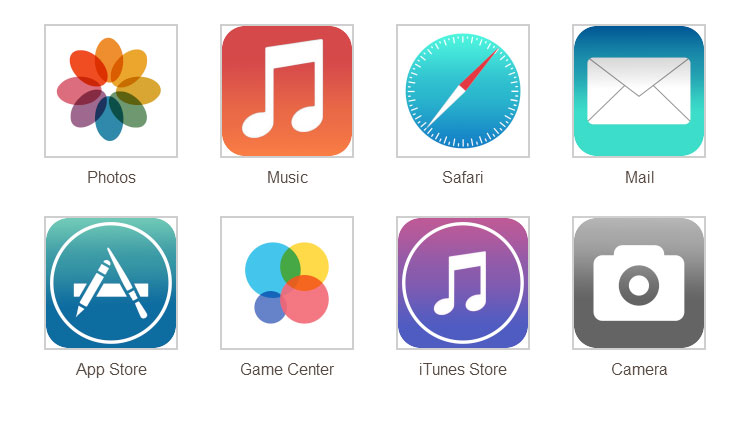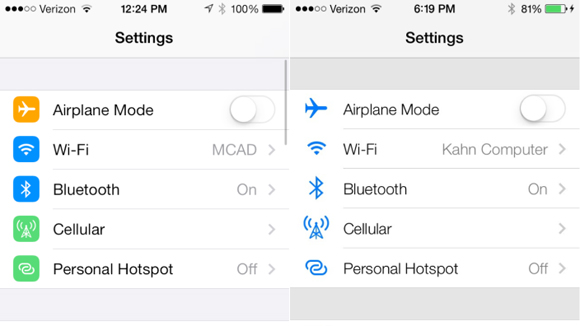iOS 7: what's different, and how is it better for work?
How Improved security and central control work alongside a BYOD strategy

As Apple gears up to its iOS 7 launch this month, many small and mid-sized businesses (SMBs) are considering a move or upgrade.
The updated operating system is said to be the biggest evolution of the manufacturer's software yet and, in theory, it is ideal for SMBs.
Features such as mobile device management provide firms with the long-awaited facility to manage and partition devices. Meanwhile, additional central control makes iOS 7 a good fit for a bring your own device (BYOD) environment.
Apple's focus on business takes aim at ailing BlackBerry, which is losing ground in the SMB market as cheaper and easier-to-manage options become available.
Android is already capitalising on this: its open interface is easy to overlay with features such as mobile device management. Yet concerns remain over its security.
BYOD
So do iOS 7's enterprise features cut it in the SMB market? Most experts think so.
With a growing number of SMBs using iPhones, especially as part of a BYOD strategy, one of the most useful features is the per app VPN. This enables apps to be configured to automatically connect to a VPN when launched, and managed by a central dashboard. It gives greater control to IT, and allows personal data to be kept separate.
Sign up to the TechRadar Pro newsletter to get all the top news, opinion, features and guidance your business needs to succeed!
Also, if you're using iOS already, you won't have to re-add your current apps; you can simply adjust your central tools.
"One of the biggest concerns with BYOD is the security of corporate data. This version of iOS addresses that issue," says Sanchit Vir Gogia, Chief Analyst and CEO of Greyhound Research. "The per app VPN ensures enterprise apps are configured to automatically connect to VPN when they are launched, giving the company control over official data."
Another feature for additional control is 'open in management' - the ability to manage which apps you can open documents in. While it was previously possible to restrict which apps showed up, you can now do this from a central network.
With iOS 7, you also have the ability to open PDF documents in the default mail application that comes with the device. Previously, this was only possible using third-party applications.
Apple's latest iOS also enables SMBs to save money on licensing. Previously, you could bulk-buy licences from the App Store and assign these to employees, but the license would remain tied to the member of staff. Handily for cash-strapped SMBs, iOS 7's App Store licence management provides the ability to revoke and reassign access, taking away the need for additional licences.
Security
Historically, security on multiple Apple devices has been a complex task, because iOS was limited by a sandbox-type environment - causing problems sharing data.

But employee authentication is much easier in iOS 7. Apple's enterprise single sign-on facilitates user credentials being used across apps, including those bought from the App Store.
"Apple knows it has to ensure that businesses don't switch over to its competitors," says Isa Ranjha, Apple Developer. "The ability to have one username and password; and to be able to use that across corporate apps, or even apps in the Apple App Store, cuts out a middleman credential manager. This improves security and removes the need to remember multiple passwords."
And iOS 7's data protection credentials also have also improved. The third-party data protection feature in iOS 7 sees data protection built into all third-party apps from the App Store, with information collected using a passcode.
Consequently, if the phone gets lost or stolen the data can't be accessed without the passcode. Applications are protected too, and it's all automatic. It was previously possible to encrypt data, but you always had to opt in.
Mobile device management
With competition raining in from all sides, Apple has also realised the need to accommodate effective mobile device management (MDM). New features mean business devices can be automatically enrolled. Meanwhile, updated configuration options make it easier to manage third-party MDM solutions, with the ability to wirelessly set up managed apps and configure accessibility options.
The ease of configuration brought about by the new MDM settings is a big benefit, reckons Gogia, because it means devices can be automatically configured into a device management scheme.
Other changes to Apple's OS are subtler, but nonetheless make working more seamless. For example, multitasking updates will see iPhones becoming more intelligent and learning your behaviour. If you use a business app such as Office at a certain time of day, the app will update before you go in, so there's no lag time waiting for the information to come up.
Despite all this, Apple's latest iOS is hardly a business revolution; most of the new features have already been done by its competitors and can be easily imitated on Android devices.
But compared with Blackberry, which is less flexible and better suited to larger enterprises, iOS 7 represents a clear-cut option. And as Apple gives more control to IT, firms who already use iOS should think twice before switching.
- Why not check out our iOS 7 release date, news and features article?